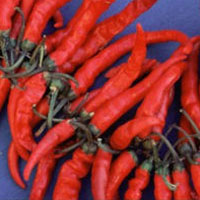Chili Peppers
 © Steven Foster
© Steven FosterHow It Works
Chili peppers contain a resinous and pungent substance known as capsaicin. Topical application of capsaicin relieves pain and itching by acting on sensory nerves.1 Capsaicin temporarily depletes “substance P”, a chemical in nerves that transmits pain sensations. Without substance P, pain signals can no longer be sent. The effect is temporary. Numerous double-blind trials have proven topically applied capsaicin creams are helpful for a range of conditions, including nerve pain in diabetes (diabetic neuropathy),2, 3 post-surgical pain,4, 5, 6psoriasis,7 muscle pain due to fibromyalgia,8 nerve pain after shingles (postherpetic neuralgia),9, 10osteoarthritis pain,11, 12 and rheumatoid arthritis pain.13
With the aid of a healthcare professional, capsaicin administered via the nose may also be a potentially useful therapy for cluster headaches. This is supported by a double-blind trial.14 Weaker scientific support exists for the use of capsaicin for migraines.15
Injecting capsaicin directly into the urinary bladder has reduced symptoms of one type of bladder dysfunction (neurogenic hyperreflexic bladder)16 that results from spinal cord and other nerve injuries. Capsaicin is not known to help other bladder conditions, such as chronic bladder pain. The placing of cayenne or capsaicin products into the bladder has only been performed in clinical experiments and should only be done by a urologist.
Modest reductions in appetite have been found in healthy Japanese women and white men when they consumed 10 grams of cayenne pepper along with meals in a double-blind trial.17 A similar trial found that cayenne could increase metabolism of dietary fats in Japanese women.18 These trials suggest cayenne may help in the treatment of obesity.
In a double-blind study of people with dyspepsia (heartburn), supplementation with 833 mg of cayenne powder in capsules, three times per day before meals, reduced heartburn symptoms by 48%, compared with a placebo. However, two of 15 individuals receiving cayenne discontinued it because of abdominal pain.19
How to Use It
Topical creams containing 0.025 to 75% capsaicin are generally used.20 People often apply the cream to the affected area three or four times per day. A burning sensation may occur the first several times the cream is applied. However, this should gradually decrease with each use. The hands must be carefully and thoroughly washed after use, or gloves should be worn, to prevent the cream from accidentally reaching the eyes, nose, or mouth, which would cause a burning sensation. Do not apply the cream to areas of broken skin. For internal use, cayenne tincture (0.3–1 ml) can be taken three times per day. An infusion can be made by pouring 1 cup (250 ml) of boiling water onto 1/2–1 teaspoon (2.5 to 5 grams) of cayenne powder and let set for 10 minutes. A teaspoon of this infusion can be mixed with water and taken three to four times daily. In the treatment of heartburn, researchers have used 833 mg of cayenne powder in capsule form, taken three times per day before meals.21
Copyright © 2025 TraceGains, Inc. All rights reserved.
Learn more about TraceGains, the company.
The information presented by TraceGains is for informational purposes only. It is based on scientific studies (human, animal, or in vitro), clinical experience, or traditional usage as cited in each article. The results reported may not necessarily occur in all individuals. Self-treatment is not recommended for life-threatening conditions that require medical treatment under a doctor's care. For many of the conditions discussed, treatment with prescription or over the counter medication is also available. Consult your doctor, practitioner, and/or pharmacist for any health problem and before using any supplements or before making any changes in prescribed medications. Information expires December 2025.
